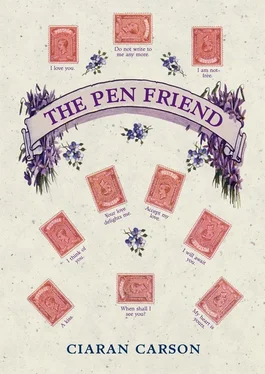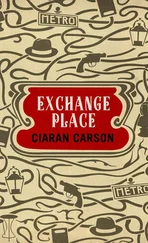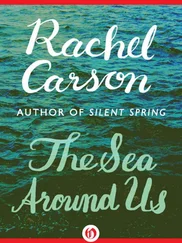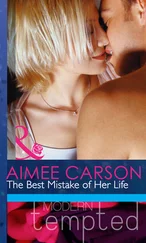I didn’t know you did magic, Beringer, I said. Oh, only for special customers, Mr Gabriel, it wouldn’t do to let the general public know that an antiques dealer has stuff like this up his sleeve. As a matter of fact, I learned that one from your late father, God rest his soul, he said, and I suddenly remembered that when I was a child my father had a whole repertoire of these tricks, making things appear from nowhere. So here I am now, writing with the Dinkie that came from nowhere — though Beringer, true to form, did give me an elaborate account of its provenance. When I saw it I realised it wasn’t quite as spectacular-looking as some of the pens I’d acquired before it — the Oriental Peacock Dinkie, for example — but nevertheless its colours glow with the intensity of my memory of them, and it gives me pleasure to write with a pen that resembles yours so closely, as I here transcribe the words of your letter, knowing that by writing them again in my own hand, following the loops and curves of your thought, I will gain a better understanding of them.
… you remember, red and black, you wrote, le rouge et le noir, I wrote all those letters to you then with my Conway Stewart Dinkie. I don’t know who started that business, writing to each other practically daily sometimes, whether it was you or me. You used to joke about it, said it would be good training for mo2, all those memoranda I had to write, or was supposed to write. But when I began sending the postcards, I knew I couldn’t write at any length, I had to work up to it, for I didn’t entirely understand myself what had happened. You must know that after I left you I was very confused. ‘Paint It Black’ kept going through my head
I see a red door and I want it painted blackNo colours any more I want them to turn black …
So I got out, I’d saved up quite a bit from my business, enough to last me a good few months, and I went to Paris, where I knew I could get a job with my French, the French like Englishwomen with a bit of style who can speak good French, though I had to tone down my French accent a bit, make it more English, for that’s the whole point, that you’re an Englishwoman speaking French.
And for six months I did nothing, I got a little apartment near Les Halles, in rue Montmartre, I’d just go for long walks, trying to forget how we’d been in Paris together. Then I got a job in a fashion photography agency. And I fell for one of the photographers, and it took me a while to realise that it was because he reminded me of you, he looked at things in that admiring way, without quite engaging with them, he saw the world in terms of photographs, though he wasn’t half as good as he thought he was. So I dropped him. And I hesitated about telling you this, but you might as well know, because everything I’ve done since I left you has led to this moment where I write to you again, now, after twenty years.
After the photographer, I took up with a married man, one of those minor French politician-intellectuals, oh, nothing physical, in fact I think he was a closet gay, it was a business arrangement if you like, I was his escort, the kind of woman his kind of man likes to be seen with in discreet restaurants. He was very charming, and very well read, we’d have this French Symbolist thing going, matching quotations from Baudelaire and Mallarmé, and eating with him was a real pleasure, if a trifle analytical, you know that way the French have to talk their food as well as eat it. He admired me, and I him. And I enjoyed the mutual flattery for a while, not to mention the discreet restaurants, but then it seemed to me he was flaunting me a little too much, I was becoming too much of an ornament, so I got out of that relationship too. And there were others, but nothing to write home about.
And you, you were like a ghost that would sometimes appear in my dreams, and I would dream of you being with other women, other ghosts perhaps. So very slowly I began to think of getting in touch again, but I deferred it for years, until I went through that shoebox full of postcards. And the more I thought of you, the more I thought of how we’d been together in different places, and how you saw the world, sometimes as I saw it, but sometimes quite differently. You used to joke, dear Angel, how I was always one step ahead of you, but if I was, you had a more considered view of the landscape. I always wanted to see what was round the next corner, while you took time to look at what was present. So I thought I’d send the postcards from different places, somewhere we had been together, others not. For I wanted to imagine what you would have made of those places, like Stroud, where I’d never even been myself, but I knew you would remember how I told you of my father’s stint in the Erinoid factory at Lightpill, how I would dream of him driving the night train home to London, to me, his face lit by the glow from the open fire-box door, steam hissing from the brass pipes, the smokestack bearing its long plume of smoke through the darkness.
Of course Stroud had changed a lot from my father’s time, the Erinoid factory had long since closed down, but that was the point, I was seeing it anew, through your eyes, as I imagined. They had set up a little Erinoid museum, you would have loved it, they had displays of Erinoid buttons, mock ivory and tortoiseshell, all the colours of the rainbow, door handles, umbrella handles, radio cabinets, the plastic rods that they used to drill out pen casings from, in fantastic marble effects. What they didn’t have was the smell, though they told you about it, milk curd and formaldehyde, what a stink that must have been. And I remembered how my father’s clothes would smell funny when he got home, I thought it was the smell of coal-smoke and steam from the engine. I think that’s why I sent you the Berlin postcard, the one of the steam engine on the viaduct over Friedrichstrasse, but also because we got lost on the S-Bahn, you remember, we got off at the wrong stop and ended up in Kreuzberg, and we came across that little antique shop where you bought the Russian icon, I hadn’t the courage to tell you I thought it was a fake, and what did it matter anyway, you were so delighted by it. And the subject was so fitting, an Annunciation, the Angel Gabriel appearing to the Virgin, you especially liked the blue of her cloak, it was like an Yves Klein Blue, you said, it was remarkable how it had kept its colour over all that time. You mean the blue he used to paint naked women with, and have them roll them around on a canvas? I said, and you looked at me suspiciously, thinking I was winding you up …
I’d quite forgotten about that icon, Nina, I probably still have it lying at the back of a drawer somewhere. Maybe the blue’s faded by now. But your mention of blue leads me to take up another pen, for the small Dinkie, as I knew it would, is beginning to tire my hand, so I’ve gone for a Cobalt Blue Esterbrook with a 9556 Fine Writing nib, it’s got a much firmer feel to it than the flexible Conway. It’s a very trustworthy pen. That’s the thing about vintage pens, or at least vintage pens of this low-to-medium price range, you don’t often get fakes. There’s no point in faking something like a Conway Stewart or an Esterbrook, the bother and expense you’d have to go to would be counter-productive. Oh, of course I’ve bought things on eBay that turn out not to be what I thought they were, but that’s because I read too much into the poor description, or was inveigled by the eloquent description, or the photograph presented it in a flattering light, or I imagined it might be better than the unflattering photograph. I was the victim of my own wishful thinking. Most sellers are not dishonest, it’s just that sometimes they don’t know what they’re selling, and describe it wrongly, or don’t know how to describe it. I still get annoyed when I see someone call a dip pen a fountain pen. In any case, the buyer should always beware. As it turned out, I got the Cobalt Blue Esterbrook for what seemed to me a bargain price of some twenty dollars from a seller in Canton, Ohio, and, as I loaded it with blue Quink, I remembered the postcard you’d enclosed with your letter. It had fallen to the floor face down; there was nothing written on it, but the image on the other side had words enough. It was a photograph of a New Testament with a bullet embedded in its back, and a caption below, handwritten in block letters:
Читать дальше












